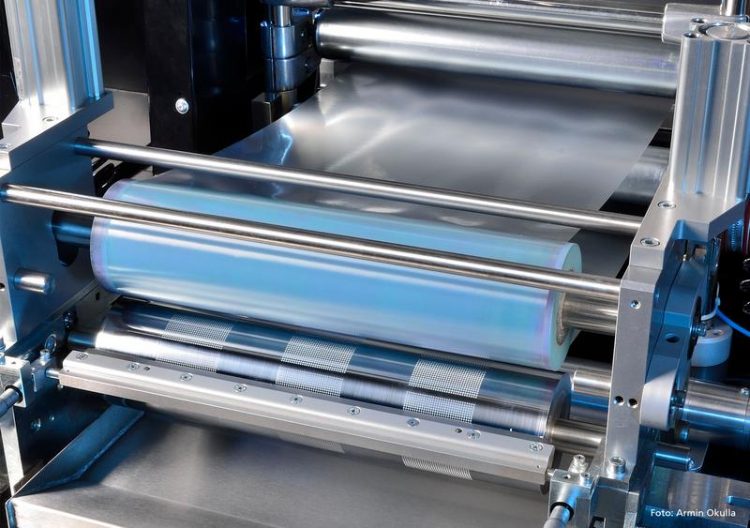Roll-to-roll processes: Network R2RNet bundles expertise for the continuous functionalization of surfaces

Structured surface functionalization of foils using R2R technology, e.g. for the production of microarrays. © Fraunhofer IAP, Foto: Armin Okulla
In the R2RNet network, founded on June 10, 2020, 21 European partners from industry, research organizations and universities are pooling their expertise in the continuous functionalization of surfaces in the roll-to-roll process.
The aim is to promote the exchange of experience and to facilitate access to these technologies and to corresponding equipment.
The network was initiated by the Fraunhofer Institutes for Applied Polymer Research IAP and for Interfacial Engineering and Biotechnology IGB.
The applications of R2R technology are extremely diverse: In the field of biological and medical diagnostics, for example, surfaces with immobilized biologically active substances are required that can be produced cost-effectively in large quantities on film rolls.
Membranes with continuously produced, well-defined nanoscale functionalization of the pore surfaces are used in drinking water treatment or for batteries and fuel cells. And for solar thermal applications, optical coatings are produced on metal foils, to name just a few examples of applications.
R2R technologies enable continuous surface functionalization of large substrates ̶ chemically, physically or by structuring ̶ and thus offer high productivity at comparatively low cost.
For example, the production by roll-to-roll functionalization of flexible substrates can be more than ten times cheaper than treating individual films or sheets.
However, the relatively high cost of R2R equipment, limited access to know-how and high production volumes represent a relatively high threshold for a first market entry with new products.
In Europe, a number of companies manufacture components or entire plants for the surface functionalization of web materials. Research institutes and universities are developing technologies for R2R production, mostly as a scale up of discontinuous batch processes.
These competencies, the bundled know-how and access to various plants are to be linked and combined within R2RNet.
The 21 partners from ten European countries want to promote the exchange of experience and cooperation, enable new technological developments and provide potential users with support for scale-up and implementation of production.
https://www.iap.fraunhofer.de/en/press_releases/2020/r2r-net.html
Media Contact
All latest news from the category: Process Engineering
This special field revolves around processes for modifying material properties (milling, cooling), composition (filtration, distillation) and type (oxidation, hydration).
Valuable information is available on a broad range of technologies including material separation, laser processes, measuring techniques and robot engineering in addition to testing methods and coating and materials analysis processes.
Newest articles

Bringing bio-inspired robots to life
Nebraska researcher Eric Markvicka gets NSF CAREER Award to pursue manufacture of novel materials for soft robotics and stretchable electronics. Engineers are increasingly eager to develop robots that mimic the…

Bella moths use poison to attract mates
Scientists are closer to finding out how. Pyrrolizidine alkaloids are as bitter and toxic as they are hard to pronounce. They’re produced by several different types of plants and are…

AI tool creates ‘synthetic’ images of cells
…for enhanced microscopy analysis. Observing individual cells through microscopes can reveal a range of important cell biological phenomena that frequently play a role in human diseases, but the process of…





















